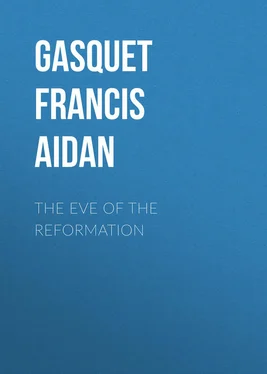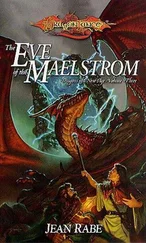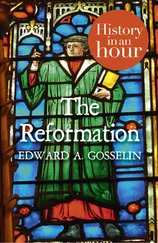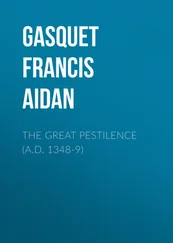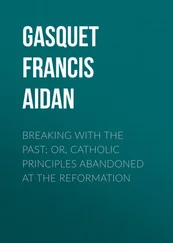Francis Gasquet - The Eve of the Reformation
Здесь есть возможность читать онлайн «Francis Gasquet - The Eve of the Reformation» — ознакомительный отрывок электронной книги совершенно бесплатно, а после прочтения отрывка купить полную версию. В некоторых случаях можно слушать аудио, скачать через торрент в формате fb2 и присутствует краткое содержание. Жанр: foreign_antique, foreign_prose, на английском языке. Описание произведения, (предисловие) а так же отзывы посетителей доступны на портале библиотеки ЛибКат.
- Название:The Eve of the Reformation
- Автор:
- Жанр:
- Год:неизвестен
- ISBN:нет данных
- Рейтинг книги:3 / 5. Голосов: 1
-
Избранное:Добавить в избранное
- Отзывы:
-
Ваша оценка:
- 60
- 1
- 2
- 3
- 4
- 5
The Eve of the Reformation: краткое содержание, описание и аннотация
Предлагаем к чтению аннотацию, описание, краткое содержание или предисловие (зависит от того, что написал сам автор книги «The Eve of the Reformation»). Если вы не нашли необходимую информацию о книге — напишите в комментариях, мы постараемся отыскать её.
The Eve of the Reformation — читать онлайн ознакомительный отрывок
Ниже представлен текст книги, разбитый по страницам. Система сохранения места последней прочитанной страницы, позволяет с удобством читать онлайн бесплатно книгу «The Eve of the Reformation», без необходимости каждый раз заново искать на чём Вы остановились. Поставьте закладку, и сможете в любой момент перейти на страницу, на которой закончили чтение.
Интервал:
Закладка:
First among the scholars who repaired thither from England to drink in the learning of ancient Greece and bring back to their country the new spirit, we must place two Canterbury monks named Selling and Hadley. Born somewhere about 1430, William Selling became a monk at Christchurch, Canterbury, somewhere about 1448. There seems some evidence to show that his family name was Tyll, and that, as was frequently, if not generally, the case, on his entering into religion, he adopted the name of Selling from his birthplace, some five miles from Faversham in Kent. 13 13 Leland ( De Scriptoribus Britannicis , 482) calls him Tillœus, and this has been generally translated as Tilly. In the Canterbury Letter Books (Rolls Series, iii. 291) it appears that Prior Selling was greatly interested in a boy named Richard Tyll. In 1475, Thomas Goldstone, the warden of Canterbury Hall, writes to Prior Selling about new clothes and a tunic and other expenses “scolaris tui Ricardi Tyll.” In the same volume, p. 315, is a letter of fraternity given to “Agnes, widow of William Tyll,” and on February 7, 1491, she received permission to be buried where her husband, William Tyll, had been interred, “juxta tumbam sancti Thomæ martyris.”
It is probable that Selling, after having passed through the claustral school at Canterbury, on entering the Benedictine Order was sent to finish his studies at Canterbury College, Oxford. Here he certainly was in 1450, for in that year he writes a long and what is described as an elegant letter as a student at Canterbury College to his Prior, Thomas Goldstone, at Christchurch Canterbury. 14 14 Canterbury Letters (Camden Soc.), pp. 13, 15.
He was ordained priest, and celebrated his first mass at Canterbury in September 1456. 15 15 C. C. C. C. MS. 417 f. 54d: “Item hoc anno videlicet 6 Kal. Oct. D. Willms Selling celebravit primam suam missam et fuit sacerdos summæ missæ per totam illam ebdomadam.”
In 1464 William Selling obtained leave of his Prior and convent to go with a companion, William Hadley, to study in the foreign universities for three years, 16 16 Literæ Cantuarr. (Rolls Series), iii. 239.
during which time they visited and sat under the most celebrated teachers at Padua, Bologna, and Rome. 17 17 Leland, De Scriptoribus Britannicis , p. 482. Cf. also Canterbury Letters (Camden Soc.), p. xxvii.
At Bologna, according to Leland, Selling was the pupil of the celebrated Politian, “with whom, on account of his aptitude in acquiring the classical elegance of ancient tongues, he formed a familiar and lasting friendship.” 18 18 Leland, ut supra .
In 1466 and 1467 we find the monks, Selling and his companion Hadley, at Bologna, where apparently the readers in Greek then were Lionorus and Andronicus, 19 19 Umberto Dallari, I rotuli dei Lettori, &c., dello studio Bolognese dal 1384 al 1799 , p. 51.
and where, on the 22nd March 1466, Selling took his degree in theology, his companion taking his in the March of the following year. 20 20 Serafino Mazzetti, Memorie storiche sopra l’università di Bologna , p. 308.
Of this period of work, Leland says: – “His studies progressed. He indeed imbued himself with Greek; everywhere he industriously and at great expense collected many Greek books. Nor was his care less in procuring old Latin MSS., which shortly after he took with him, as the most estimable treasures, on his return to Canterbury.” 21 21 Leland, ut supra .
His obituary notice in the Christchurch Necrology recites not only his excellence in learning, classical and theological, but what he had done to make his monastery at Canterbury a real house of studies. He decorated the library over the Priests’ Chapel, adding to the books, and assigned it “for the use of those specially given to study, which he encouraged and cherished with wonderful watchfulness and affection.” The eastern cloister also he fitted with glass and new desks, “called carrels,” for the use of the studious brethren. 22 22 B. Mus. Arundel MS. 68, f. 4. The Obit in Christchurch MS. D. 12, says: “Sacræ Theologiæ Doctor. Hic in divinis agendis multum devotus et lingua Græca et Latina valde eruditus… O quam laudabiliter se habuit opera merito laudanda manifesto declarant.”
After the sojourn of the two Canterbury monks in Italy, they returned to their home at Christchurch. Selling, however, did not remain there long, for on October 3, 1469, we find him setting out again for Rome 23 23 In the Canterbury Registers (Reg. R.) there is a record which evidently relates to Selling’s previous stay in Rome as a student. On October 3, 1469, the date of Selling’s second departure for Rome, the Prior and convent of Christchurch granted a letter to Pietro dei Milleni, a citizen of Rome, making him a confrater of the monastery in return for the kindness shown to Dr. William Selling, when in the Eternal City. This letter, doubtless, Selling carried with him in 1469.
in company with another monk, Reginald Goldstone, also an Oxford student. This visit was on business connected with his monastery, and did not apparently keep him long away from England, for there is evidence that sometime before the election of Selling to the Priorship at Canterbury, which was in 1472, he was again at his monastery. Characteristically, his letter introducing William Worcester, the antiquary, to a merchant of Lucca who had a copy of Livy’s Decades for sale, manifests his great and continued interest in classical literature. 24 24 The Old English Bible and other Essays , p. 306.
At Canterbury, Selling must have established the teaching of Greek on systematic lines, and it is certainly from this monastic school as a centre, that the study spread to other parts of England. William Worcester, keenly alive to the classical revival, as his note-books show, tells us of “certain Greek terminations as taught by Doctor Selling of Christchurch, Canterbury,” and likewise sets down the pronunciation of the Greek vowels with examples evidently on the same authority. 25 25 B. Mus. Cotton MS. Julius F. vii., f. 118.
Selling’s long priorship, extending from 1472 to 1495, would have enabled him to consolidate the work of this literary renaissance which he had so much at heart. 26 26 One of Prior Selling’s first acts of administration was apparently to procure a master for the grammar school at Canterbury. He writes to the Archbishop: “Also please it your good faderhood to have in knowledge that according to your commandment, I have provided for a schoolmaster for your gramerscole in Canterbury, the which hath lately taught gramer at Wynchester and atte Seynt Antonyes in London. That, as I trust to God, shall so guide him that it shall be worship and pleasure to your Lordship and profit and encreas to them that he shall have in governance.” — Hist. MSS. Com. 9th Report, App. p. 105.
The most celebrated of all his pupils was, of course, Linacre. Born, according to Caius, at Canterbury, he received his first instruction in the monastic school there, and his first lessons in the classics and Greek from Selling himself. Probably through the personal interest taken in this youth of great promise by Prior Selling, he was sent to Oxford about 1480. Those who have seriously examined the matter believe that the first years of his Oxford life were spent by Linacre at the Canterbury College, which was connected with Christchurch monastery, and which, though primarily intended for monks, also afforded a place of quiet study to others who were able to obtain admission. 27 27 I. Noble Johnson, Life of Linacre , p. 11. Among the great benefactors to Canterbury College, Oxford, was Doctor Thomas Chaundeler, Warden of New College. In 1473, the year after the election of Prior Selling, the Chapter of Christchurch, Canterbury, passed a resolution that, in memory of his great benefits to them, his name should be mentioned daily in the conventual mass at Canterbury, and that at dinner each day at Oxford he should be named as founder.
Thus, in later years, Sir Thomas More, no doubt through his father’s connection with the monastery of Christchurch, Canterbury, of which house he was a “confrater,” became a student at the monks’ college at Oxford. In later years Sir Thomas himself, when Chancellor of England, perpetuated the memory of his life-long connection with the monks of Canterbury by enrolling his name also on the fraternity lists of that house.
Интервал:
Закладка:
Похожие книги на «The Eve of the Reformation»
Представляем Вашему вниманию похожие книги на «The Eve of the Reformation» списком для выбора. Мы отобрали схожую по названию и смыслу литературу в надежде предоставить читателям больше вариантов отыскать новые, интересные, ещё непрочитанные произведения.
Обсуждение, отзывы о книге «The Eve of the Reformation» и просто собственные мнения читателей. Оставьте ваши комментарии, напишите, что Вы думаете о произведении, его смысле или главных героях. Укажите что конкретно понравилось, а что нет, и почему Вы так считаете.
